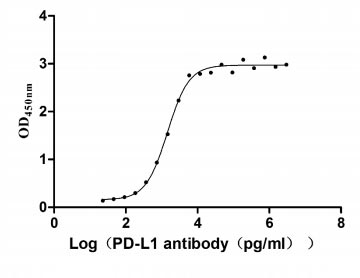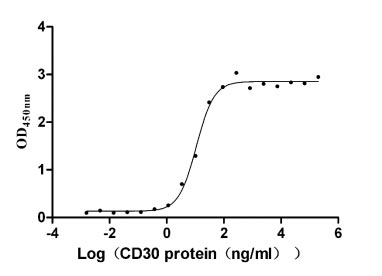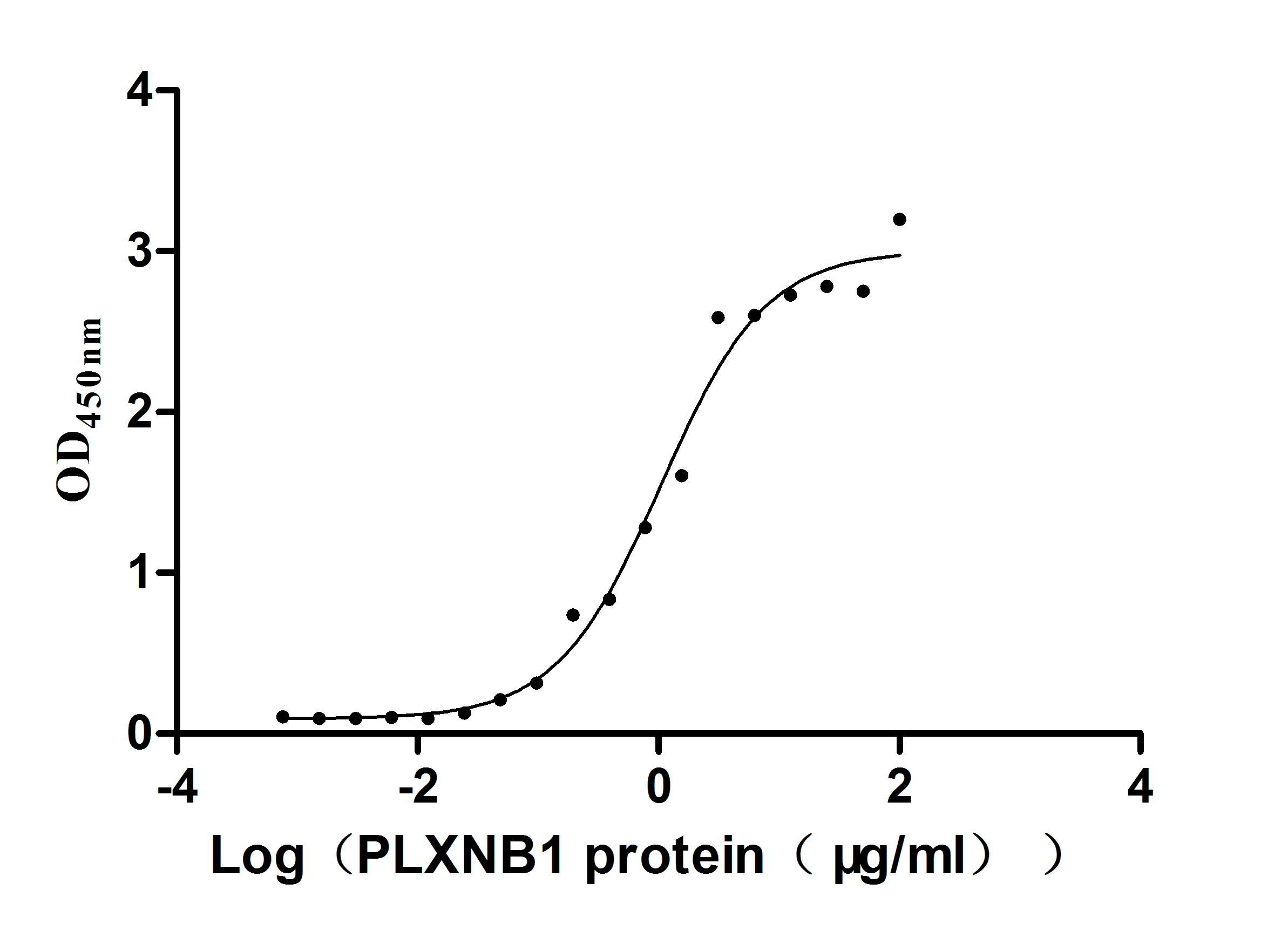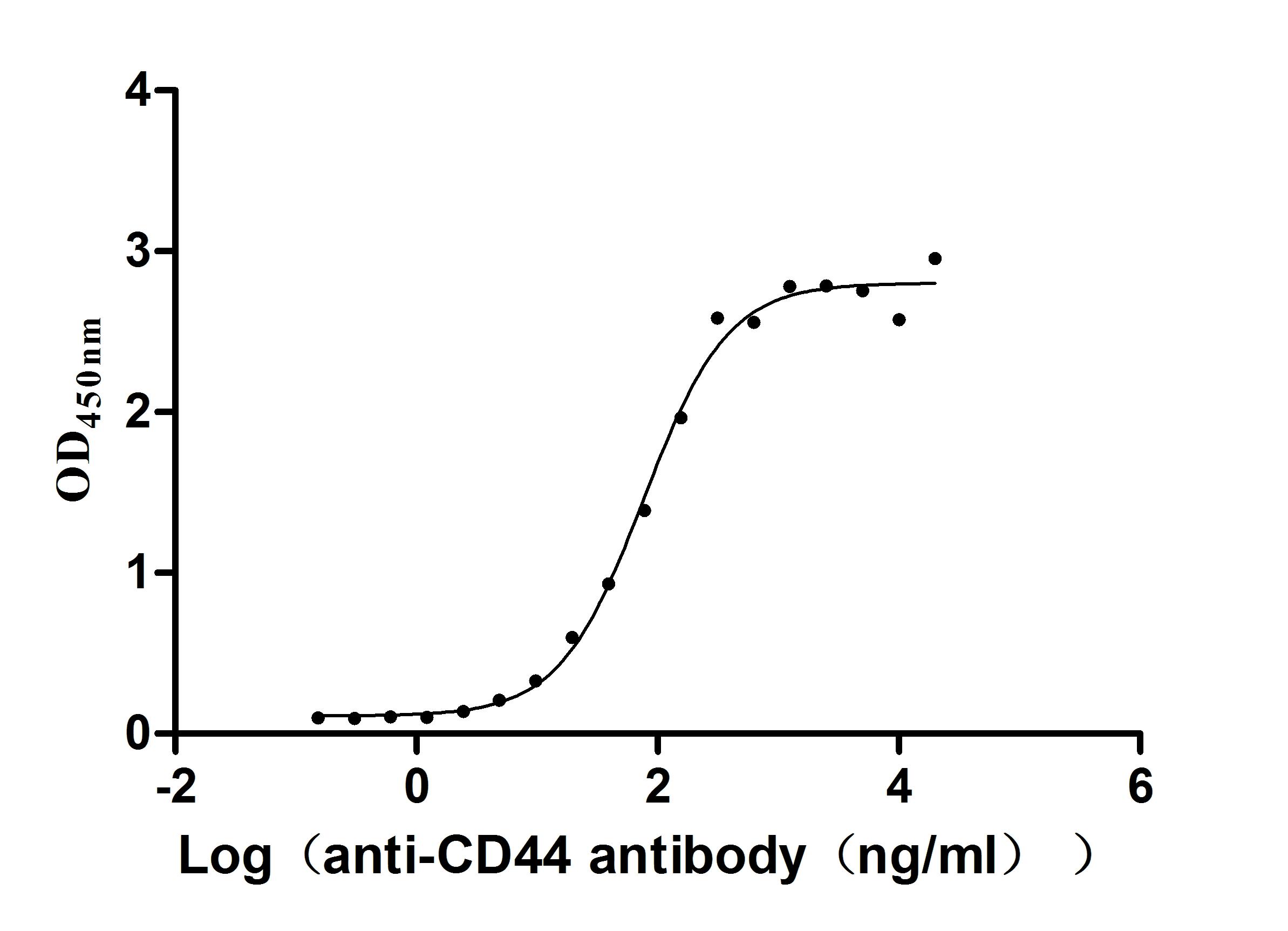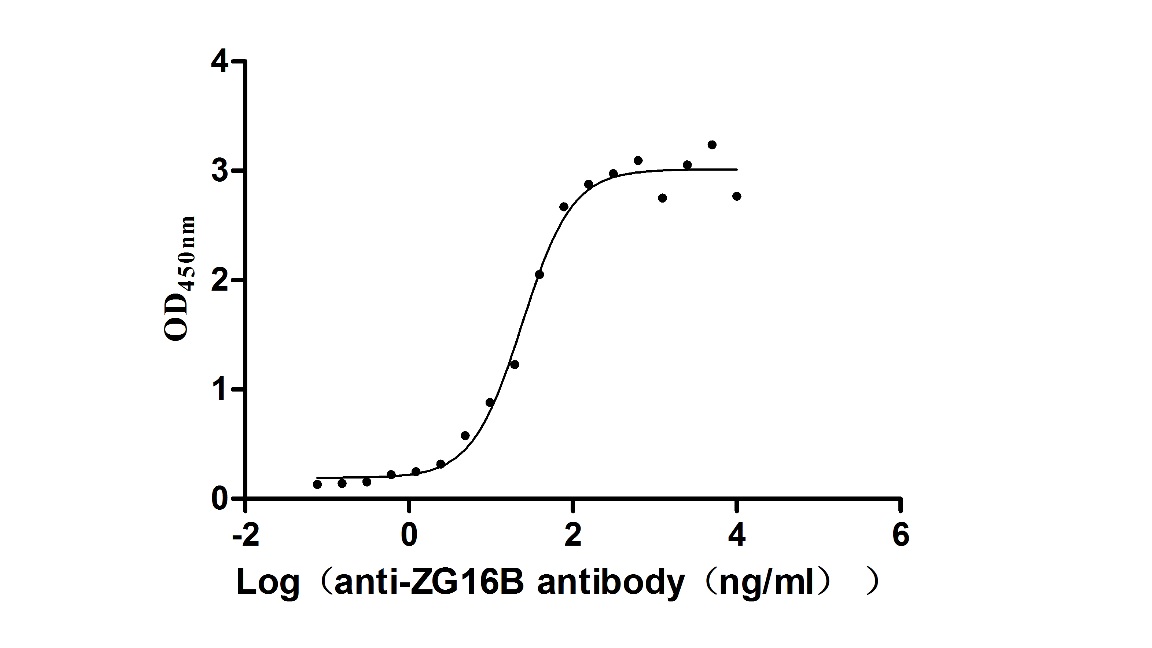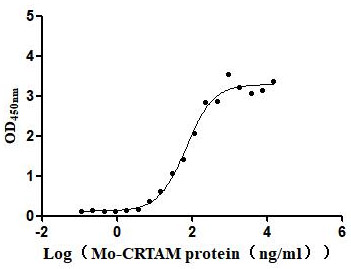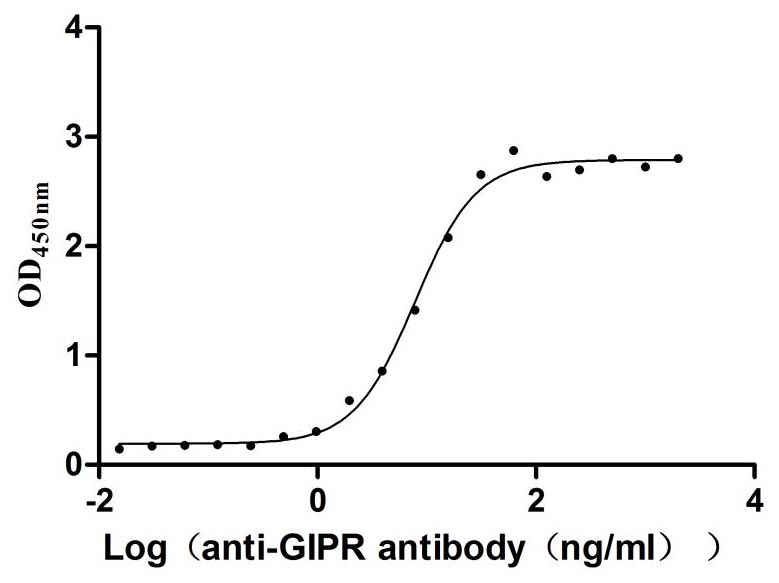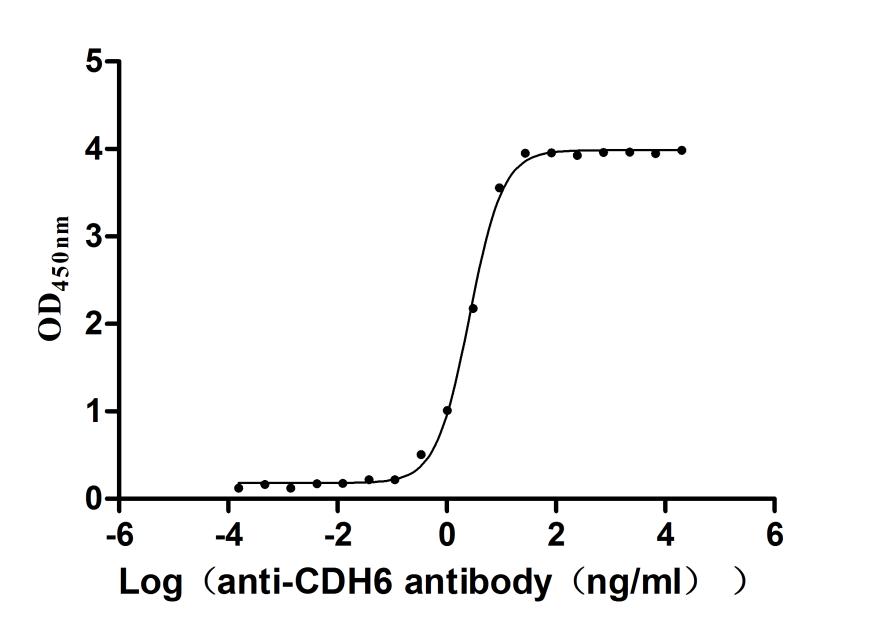Recombinant Human E3 ubiquitin-protein ligase TRIM22 (TRIM22)
-
中文名称:人TRIM22重组蛋白
-
货号:CSB-YP810305HU
-
规格:
-
来源:Yeast
-
其他:
-
中文名称:人TRIM22重组蛋白
-
货号:CSB-EP810305HU
-
规格:
-
来源:E.coli
-
其他:
-
中文名称:人TRIM22重组蛋白
-
货号:CSB-EP810305HU-B
-
规格:
-
来源:E.coli
-
共轭:Avi-tag Biotinylated
E. coli biotin ligase (BirA) is highly specific in covalently attaching biotin to the 15 amino acid AviTag peptide. This recombinant protein was biotinylated in vivo by AviTag-BirA technology, which method is BriA catalyzes amide linkage between the biotin and the specific lysine of the AviTag.
-
其他:
-
中文名称:人TRIM22重组蛋白
-
货号:CSB-BP810305HU
-
规格:
-
来源:Baculovirus
-
其他:
-
中文名称:人TRIM22重组蛋白
-
货号:CSB-MP810305HU
-
规格:
-
来源:Mammalian cell
-
其他:
产品详情
-
纯度:>85% (SDS-PAGE)
-
基因名:TRIM22
-
Uniprot No.:
-
别名:TRIM22; RNF94; STAF50; E3 ubiquitin-protein ligase TRIM22; EC 2.3.2.27; 50 kDa-stimulated trans-acting factor; RING finger protein 94; RING-type E3 ubiquitin transferase TRIM22; Staf-50; Tripartite motif-containing protein 22
-
种属:Homo sapiens (Human)
-
蛋白长度:full length protein
-
表达区域:1-498
-
氨基酸序列MDFSVKVDIE KEVTCPICLE LLTEPLSLDC GHSFCQACIT AKIKESVIIS RGESSCPVCQ TRFQPGNLRP NRHLANIVER VKEVKMSPQE GQKRDVCEHH GKKLQIFCKE DGKVICWVCE LSQEHQGHQT FRINEVVKEC QEKLQVALQR LIKEDQEAEK LEDDIRQERT AWKNYIQIER QKILKGFNEM RVILDNEEQR ELQKLEEGEV NVLDNLAAAT DQLVQQRQDA STLISDLQRR LRGSSVEMLQ DVIDVMKRSE SWTLKKPKSV SKKLKSVFRV PDLSGMLQVL KELTDVQYYW VDVMLNPGSA TSNVAISVDQ RQVKTVRTCT FKNSNPCDFS AFGVFGCQYF SSGKYYWEVD VSGKIAWILG VHSKISSLNK RKSSGFAFDP SVNYSKVYSR YRPQYGYWVI GLQNTCEYNA FEDSSSSDPK VLTLFMAVPP CRIGVFLDYE AGIVSFFNVT NHGALIYKFS GCRFSRPAYP YFNPWNCLVP MTVCPPSS
-
蛋白标签:Tag type will be determined during the manufacturing process.
The tag type will be determined during production process. If you have specified tag type, please tell us and we will develop the specified tag preferentially. -
产品提供形式:Lyophilized powder
Note: We will preferentially ship the format that we have in stock, however, if you have any special requirement for the format, please remark your requirement when placing the order, we will prepare according to your demand. -
复溶:We recommend that this vial be briefly centrifuged prior to opening to bring the contents to the bottom. Please reconstitute protein in deionized sterile water to a concentration of 0.1-1.0 mg/mL.We recommend to add 5-50% of glycerol (final concentration) and aliquot for long-term storage at -20℃/-80℃. Our default final concentration of glycerol is 50%. Customers could use it as reference.
-
储存条件:Store at -20°C/-80°C upon receipt, aliquoting is necessary for mutiple use. Avoid repeated freeze-thaw cycles.
-
保质期:The shelf life is related to many factors, storage state, buffer ingredients, storage temperature and the stability of the protein itself.
Generally, the shelf life of liquid form is 6 months at -20°C/-80°C. The shelf life of lyophilized form is 12 months at -20°C/-80°C. -
货期:Delivery time may differ from different purchasing way or location, please kindly consult your local distributors for specific delivery time.Note: All of our proteins are default shipped with normal blue ice packs, if you request to ship with dry ice, please communicate with us in advance and extra fees will be charged.
-
注意事项:Repeated freezing and thawing is not recommended. Store working aliquots at 4°C for up to one week.
-
Datasheet :Please contact us to get it.
相关产品
靶点详情
-
功能:Interferon-induced antiviral protein involved in cell innate immunity. The antiviral activity could in part be mediated by TRIM22-dependent ubiquitination of viral proteins. Plays a role in restricting the replication of HIV-1, encephalomyocarditis virus (EMCV) and hepatitis B virus (HBV). Acts as a transcriptional repressor of HBV core promoter. May have E3 ubiquitin-protein ligase activity.
-
基因功能参考文献:
- Upregulation of TRIM22 triggers the expression and oligomerization of Bak and subsequently leads to cytochrome c release in a caspase-9- and caspase-3-dependent manner. Both the RING domain and the SPRY domain of the TRIM22 molecule are associated with its pro-apoptotic function. PMID: 28079123
- miR-215 facilitated HCV replication via inactivation of the NF-kappaB pathway by inhibiting TRIM22, providing a novel potential target for HCV infection. PMID: 29749134
- Suppression of interferon-mediated anti-HBV response by single CpG methylation in the 5'-UTR of TRIM22. PMID: 28341749
- Wthis study identified a genetic variation (rs7935564 G allele) in TRIM22 gene, which encodes TRIM22 protein acting like a HIV restriction factor, as being associated with good response to dendritic cell-based immunotherapy PMID: 27704462
- TRIM5 and TRIM22 single nucleotide polymorphisms are associated to increased odds of significant liver fibrosis and sustained virological response after pegIFNalpha/RBV therapy in human immunodeficiency virus/hepatitis C virus coinfected patients. PMID: 27590274
- Infant with severe IBD characterized by granulomatous colitis and severe perianal disease, we identified a homozygous variant of TRIM22 that affects the ability of its product to regulate NOD2. PMID: 26836588
- Interferon-alpha-induced TRIM22 interrupts hepatitis c virus replication by ubiquitinating NS5A. PMID: 25683609
- regulation of FoxO4 protein expression and cell survival by TRIM22 controls TLR3-mediated IFN type I gene induction, preventing excessive antiviral response through dsRNA-induced apoptosis. PMID: 26237181
- TRIM22 could interact with IkappaB kinase (IKK)alpha but not IKKbeta and could increase the level and phosphorylation of IKKalpha through its really interesting new gene (RING) and spla-ryanodine receptor (SPRY) domains. PMID: 25510414
- Demonstrated that TRIM22 acts as a negative regulator of HIV-1 replication via inhibition of basal Sp1-driven proviral transcription. PMID: 26683615
- propose that TRIM22 is a direct target gene of PR and that it can mediate progesterone actions in uterine cells PMID: 26316153
- Data show that capsid protein p24-DsRed-Monomer was co-localized with tripartite motif containing 22 (TRIM22)-EGFP in HEK293T cells. PMID: 26271984
- A number of putative structural and functional residues, including several sites that undergo post-translational modification, were also identified in TRIM22. PMID: 24983760
- our data characterize the extensive genetic variation in TRIM22 and identify rs1063303:G>C as a highly prevalent SNP that influences its function. PMID: 24863734
- Upregulation of TRIM22 may be associated with responsiveness to Peg-IFNalpha-2a/RBV combination therapy in hepatitis C. PMID: 24889558
- TRIM5alpha and TRIM22 have differential transcriptional regulation and distinct anti-HIV roles according to infection phase. PMID: 24478420
- Data report that markers in two TRIMs, TRIM5 and TRIM22 and a marker in BST2, associated statistically with the risk of getting MS. PMID: 24066097
- TRIM22 genetic diversity affects HIV-1 replication in vitro and it is a potentially novel determinant of HIV-1 disease severity PMID: 23921607
- this study shows that TRIM22 is greatly under-expressed in breast cancer. p53 dysfunction may be one of the mechanisms for TRIM22 down-regulation. PMID: 24183724
- These data indicate that overexpression of TRIM22 may negatively regulate the TRAF6-stimulated NF-kappaB pathway by interacting with and degrading TAB2. PMID: 23818111
- p300 contributed to both IFN-gamma- and IRF-1-mediated TRIM22 transcription independent of its histone acetyltransferase activity, however, it was required for the recruitment of RNA polymerase II to TRIM22 promoter region. PMID: 23670564
- Restriction of influenza A virus replication was accounted for by the interaction between TRIM22 and the viral nucleoprotein (NP), resulting in its polyubiquitination and degradation in a proteasome-dependent manner PMID: 23408607
- TRIM22 to repress protein translation preferably of some specific mRNAs. TRIM22 represses translation by inhibiting the binding of eIF4E to eIF4G, suggesting a mechanism for regulation of protein translation PMID: 22509910
- BRG1-mediated chromatin remodeling is critical for the IFN-gamma-inducibility of TRIM22 gene. PMID: 21683060
- These data suggested that TRIM22 was a positive regulator of NF-kappaB-mediated transcription. PMID: 21651891
- Nuclear TRIM22 significantly impairs HIV-1 replication, likely by interfering with Tat- and NF-kappaB-independent long-terminal-repeat-driven transcription. PMID: 21345949
- TRIM22 inhibits HIV-1 particle production by interfering with the trafficking of Gag to the plasma membrane and is a key player in the antiviral activity of the Type I interferon response to HIV-1. PMID: 18389079
- These data suggest concordance between type 1 IFN and TRIM22 in PBMCs and that TRIM22 likely acts as an antiviral effector in HIV-1 infection. PMID: 20980524
- REVIEW: current knowledge on the anti-retroviral effects of TRIM5 alpha and TRIM22 PMID: 19943174
- endogenous TRIM22 is localized to both nucleus and cytosol in primary human mononuclear cells, as well as in the human osteosarcoma cell line U2OS PMID: 20006605
- Specific polymorphisms in tripartite motif22 (TRIM22) genes were significantly associated with rubella vaccine humoral immunity PMID: 20001730
- May be involved in proliferation and/or differentiation of leukemic cells. PMID: 15064739
- Overexpression of Staf50 inhibited the HIV-1 infection between 50% and 90% in 293 T CD4/CCR5 as well as in monocyte-derived macrophages. PMID: 16926043
- These data suggest a more complex role for TRIM22 during T lymphocyte activation than merely as an antiproliferative factor. PMID: 17970695
- A novel property of TRIM22, E3 ubiquitin ligase activity, was demonstrated. PMID: 18656448
- Study shows that human and rhesus TRIM22 localise to different subcellular compartments and that this difference can be assigned to the positively selected B30.2 domain. PMID: 19212762
- TRIM22 is an E3 Ubiquitin ligase whose expression leads to antiviral effects towards Encephalomyocarditis virus infections in HeLa cells. [TRIM22] PMID: 19218198
- Deletion of putative nuclear localization signal abolished TRIM22 localization and nuclear body (NB) formation, the B30.2/SplA and ryanodine receptor (SPRY) domain, and residues 491-494 specifically are essential for nuclear localization and NB formation. PMID: 19481078
- TRIM22-mediated anti-hepatitis B virus activity dependent on the nuclear-located RING domain PMID: 19585648
显示更多
收起更多
-
亚细胞定位:Cytoplasm. Nucleus. Nucleus speckle. Nucleus, Cajal body. Note=Localizes predominantly to the nucleus, found in cytoplasm to some extent. Forms distinct nuclear bodies that undergo dynamic changes during cell cycle progression. Nuclear bodies start to form in the early G0/G1 phase but become speckle-like in the S-phase and completely dispersed in mitosis. 35% of TRIM22 nuclear bodies overlap or are found adjacent to Cajal bodies.
-
蛋白家族:TRIM/RBCC family
-
组织特异性:Strongly expressed in peripheral blood leukocytes, spleen, thymus, and ovary. Expressed at basal levels in other tissues.
-
数据库链接:
HGNC: 16379
OMIM: 606559
KEGG: hsa:10346
STRING: 9606.ENSP00000369299
UniGene: Hs.501778
Most popular with customers
-
Recombinant Human Programmed cell death 1 ligand 1 (CD274), partial (Active)
Express system: Mammalian cell
Species: Homo sapiens (Human)
-
Recombinant Human Tumor necrosis factor ligand superfamily member 8 (TNFSF8), partial (Active)
Express system: Mammalian cell
Species: Homo sapiens (Human)
-
Recombinant Human Plexin-B1 (PLXNB1), partial (Active)
Express system: Mammalian cell
Species: Homo sapiens (Human)
-
Recombinant Macaca fascicularis CD44 antigen (CD44), partial (Active)
Express system: Mammalian cell
Species: Macaca fascicularis (Crab-eating macaque) (Cynomolgus monkey)
-
Recombinant Macaca fascicularis zymogen granule protein 16 homolog B (ZG16B) (Active)
Express system: Mammalian cell
Species: Macaca fascicularis (Crab-eating macaque) (Cynomolgus monkey)
-
Recombinant Mouse Cell adhesion molecule 1 (Cadm1), partial (Active)
Express system: Mammalian cell
Species: Mus musculus (Mouse)
-
Recombinant Rat Gastric inhibitory polypeptide receptor (Gipr), partial (Active)
Express system: Mammalian cell
Species: Rattus norvegicus (Rat)
-
Recombinant Human Cadherin-6(CDH6),partial (Active)
Express system: Mammalian cell
Species: Homo sapiens (Human)


